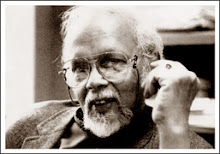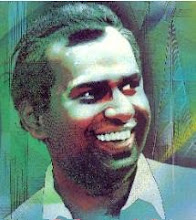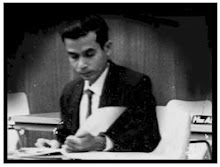| Author: Ethirajan Anbarasan Source: BBC News, Hatton, Sri Lanka |
It is an unusual folk theatre where actors as well as spectators perform together. 
The subject deals with the life and death of Lord Kama, Hindu god of love and passion.
The whole village participates in the long-running theatre - a play can go on for 11 or 30 days - that eventually becomes a kind of festival.
At a time when many folk traditions are struggling for survival, kamankoothu, a centuries-old folk theatre is still being performed among Tamils of Indian origin in central Sri Lanka.
The Indian Tamils, mostly tea and rubber plantation workers, believe that they will become prosperous if they celebrate the festival of Lord Kama every spring.
While professionals take centre stage, villagers also take part, usually as a result of vows and prayers they have made at critical moments in their lives, such as before the birth of a child, or when they are hoping for a good harvest.
"Villagers sometimes make vows when they are in distress. Once their prayers are answered they will participate in the kaman theatre," says Anthony Raja, a Kandy-based researcher on folk traditions.
Hard life
A hard life faced thousands of labourers brought from southern India to work on the plantations by the British in the early 19th century.
Social and geographical divides on the island prevented them from mixing with either the majority Sinhala or the Sri Lankan Tamil population. ![]()

![]() Even my sons are not interested in this folk theatre. I am afraid it may die with me
Even my sons are not interested in this folk theatre. I am afraid it may die with me ![]()
Their only solace came from folk traditions which helped them to escape from their miserable lives in an alien environment.
Unlike many other folk forms, kamankoothu is a religious tradition as well as a form of entertainment.
The performance is tinged with sadness.
It has its roots in a legend in which Hindu god Shiva the destroyer reduced Kama to ashes when the latter apparently disturbed his prayers.
When Kama's grief stricken wife prayed to Shiva to return her husband, he agreed to restore Kama, but only as an invisible man.
During the festival, villagers split in groups while fiercely debating whether Shiva did indeed reduce Kama to ashes.
On the sidelines, street theatre performances showcase various legends from Hindu mythology.
Villagers play the roles of Hindu gods or demons.
Interestingly, the play moves beyond the stage.
Rituals and celebrations happen in different parts of the village.
The performance stretches over many days with plots, sub-plots and sometimes a play-within-a play. The songs, music and dance all contribute to the drama.

"People will dismiss you in no time if your verses and narration do not impress them. We constantly try to add novelty in our performances," says Pichaiah, a kamankoothu director-composer from the central town of Hatton.
Unlike many other composers, Mr Pichaiah cannot read and write. But he learnt hundreds of songs from his teachers and now makes a living by performing folk arts among plantation workers.
Pichaiah regrets that kamankoothu does not interest the youngsters, who are more hooked on movies and soaps.
"Even my sons are not interested in this folk theatre. I am afraid it may die with me," he says.




































No comments:
Post a Comment